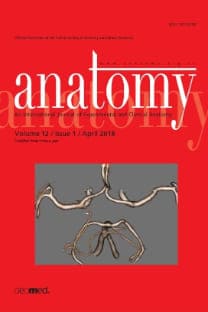Bologna Process: elective lectures and internships in medical curriculum and the role of anatomy electives
Bologna Process: elective lectures and internships in medical curriculum and the role of anatomy electives
___
- 1. The European higher education area. The Bologna Declaration of 19 June 1999. Joint declaration of the European ministers of education (Bologna). [Internet]. [cited 2017 Oct 23]. Available from: [http://www. bologna-bergen2005.no/Docs/00-Main_doc/990719bologna_ declaration.pdf ]
- 2. Christensen L. The Bologna Process and medical education. Med Teach 2004;26:625–9.
- 3. Cumming A. The Bologna process, medical education and integrated learning. Med Teach 2010;32:316–8.
- 4. Hensen P. The “Bologna Process” in European higher education: impact of bachelor's and master's degrees on German medical education. Teach Learn Med 2010;22:142–7.
- 5. Masic I. Quality assessment of medical education at Faculty of Medicine of Sarajevo University – comparison of assessment between students in Bologna process and old system of studying. Acta Inform Med 2013;21:76–82.
- 6. Patrício M, Harden RM. The Bologna Process – a global vision for the future of medical education. Med Teach 2010;32:305–15.
- 7. Masic I, Begic E. Efficiency of implementation of the Bologna process at Medical Faculty, University of Sarajevo. Mater Sociomed 2015;27:59–63.
- 8. Zapantis A, Machado C, Nemire R, Leung S. An elective course in adult acute care medicine using a hybrid delivery system. Am J Pharm Educ 2008;72:105.
- 9. Marshall LL, Ashworth LE. An elective course in women's health. Am J Pharm Educ 2010;74:12.
- 10. Zalihiç A, Cerni Obrdalj E. “Fundamental communication skills in medical practice” as minor elective subject. Acta Med Acad 2014;43: 87–91.
- 11. Mouradian WE, Reeves A, Kim S, Lewis C, Keerbs A, Slayton RL, Gupta D, Oskouian R, Schaad D, Kalet T, Marshall SG. A new oral health elective for medical students at the University of Washington. Teach Learn Med 2006;18:336–42.
- 12. Chew D, Jaworsky D, Thorne J, Ho M, Andany N, Morin C, Hoffman N, Henshaw C, Rourke SB, Fisher M, Rachlis A. Development, implementation, and evaluation of a student-initiated undergraduate medical education elective in HIV care. Med Teach 2012;34:398–403.
- 13. Caro-Bruce E, Schoenfeld E, Nothnagle M, Taylor J. Addressing gaps in abortion education: a sexual health elective created by medical students. Med Teach 2006;28:244–7.
- ISSN: 1307-8798
- Yayın Aralığı: 3
- Başlangıç: 2007
- Yayıncı: Deomed Publishing
Faizullah MASHRİQİ, Anthony V DANTONİ, Charlotte WİLSON, Florence UNNO, Cara Beth LEE, Keith MAYO, R. Shane TUBBS
Ismail Temitayo GBADAMOSİ, Tolulope Timothy AROGUNDADE, Bernard Ufuoma ENAİBE, Oluwaseun Olaniyi ADİGUN, Foyeke Munirat ADİGUN
The atlanto-occipital joint: a concise review of its anatomy and injury
R. Shane TUBBS, Paul J CHOİ, Gergely BODON
Alexandra FAYNE, Peter COLLİN, Melissa DURAN, Helena KENNEDY, Kiran MATTHEWS, R. Shane TUBBS, Anthony V DANTONİ
Emel ULUPINAR, Elif Polat ÇORUMLU, Osman Özcan AYDIN
R. Shane TUBBS, Paul J CHOİ, Gergely BODON
The zona orbicularis of the hip joint: anatomical study and review of the literature
R Shane TUBBS, Melissa DURAN, Alexandra FAYNE, Peter COLLİN, Helena KENNEDY, Kiran MATTHEWS, Anthony V DANTONİ
MURAT ÇETKİN, MUSTAFA ORHAN, İLHAN BAHŞİ, PİRAYE KERVANCIOĞLU
Hypertrophy of the transverse ligament caused by os odontoideum: a case report
Vaner KÖKSAL, Seda AVNİOĞLU, Tolga ERTEKİN
An abnormally positioned and morphologically variant sigmoid colon: case report
Dawit Habte WOLDEYES, Shibabaw Tedila TİRUNEH, Yibeltal Wubale ADAMU, Abebe Ayalew BEKEL
